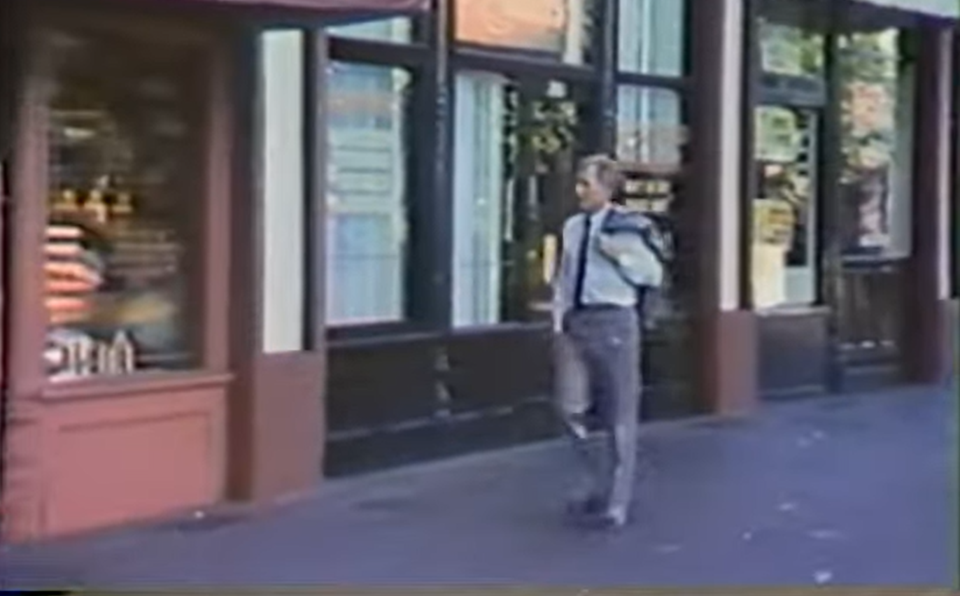Few people have had an impact on Vancouver more than Arthur Erickson.
The internationally renowned architect designed or co-designed Simon Fraser University's campus, UBC's Museum of Anthropology, and Robson Square (including the design of the courthouse and renovations to the current Vancouver Art Gallery), along with many other projects.
One of Canada's most famous architects, Erickson spent most of his life in Vancouver. He was born here, established himself as an architect here, and passed away here in 2009. And he had some thoughts on the city.
In 1983 he made Vancouver: A Portrait by Arthur Erickson, a half-hour video which is essentially an essay by Erickson on Vancouver, his personal philosophy on architecture, and the intersection of the two, giving an insight into what he hoped for the city's future.
"I don't think we humans have been that intelligent"
While a fan of Vancouver, Erickson doesn't start off with the kindest words about the city.
"So many people have said that Vancouver is an ugly city in an absolutely superb location," opens Erickson.
"There's no question that nature has been extraordinarily kind to Vancouver, and I don't think we humans have been that intelligent with what we have done."
The natural and built environment
One of Erickson's central tenets is harmony between a structure or city and the natural setting.
"It's this relationship between society and the environment that is the basis of civilization as I see it," he explains.
Throughout the video, he points out that Vancouver has been shaped by its location and setting due to its natural beauty, isolation from the rest of Canada, and environment (including the inconsistent weather throughout the year, compared to other cities).
"I think to truly understand Vancouver one should never look at it apart from its surroundings, its climate, its setting, for these are the elements from which it emerged," Erickson explains. "I think nature is very beautiful, very cruel, very demanding on the West Coast and I think the rain is part of that."
Instead of trying to avoid the greyness of wet Vancouver weather with bright designs, Erickson suggests steering into it.
"You have to develop an architecture that works with grey before you can achieve a harmony with the environment," he says.
Along with the grey, Vancouver has an issue with greenery, he adds.
"The problem here is not how to get things to grow but how to stop them from growing," he says, noting the "natural fertility" of the city.
The balance of nature and civilization is central to Erickson's ideas, but he later notes it's not always been the case in Vancouver.
"By and large I'm afraid the development of Vancouver has reflected a rather indifferent attitude, but there is one area of Vancouver at least where man has built in harmony with nature."
In talking about Stanley Park and the seawall, Erickson says it "is probably one of the great monumental works of construction in Vancouver."
A fitting thought for the man behind many monumental projects himself.
A young, brash city
Like other North American cities, he also notes there's a newness to Vancouver, compared to European or Asian cities he's travelled in, which means people aren't as affectionate towards the city; it's an issue he wishes would change.
"I suspect people who say they love Vancouver are usually in love with the setting, not the city," he says, later noting it's changing as festivals and public activities grow.
Historically, he also theorizes that settlers in Vancouver in the mid- to late-1800s had a combative mindset when it came to the natural setting.
"There was so much here, that I guess the natural reaction was to tame it as quickly and effectively as possible," he says, noting the railways that were essential to Vancouver's growth in the 1890s onward required blowing up mountains and tearing down forests.
A tale of two neighbourhoods
Erickson profiles two neighourhoods in Vancouver, the West End and Chinatown; one he's a fan of and the other he's hopeful for.
"The wonderful thing about Vancouver's Chinatown is that it looks like you could step into it and feel like you were in Hong Kong or even parts of mainland China," he says of the neighbourhood circa 1983. "There's something very natural and uncontrived about it. It hasn't been made for tourists but for the Chinese and this is where they live, this is where they work."
Another central theme for Erickson is providing a natural public space where people can mingle and interact, growing a vibrant culture.
"In Chinatown the streets are where people live and socialize, where there is a vitality because people enjoy being here," he says. "There is a spontaneity here that you just don't find in most North American cities."
Meanwhile, the West End was a typical North American neighbourhood where neighbours didn't know each other, but in the video Erickson is hopeful that culture is changing as it becomes more dense.
"You even need to have the discomfort of too many people before that energy, that charge begins to develop that is the basis of a culture," he says, noting the West End was getting denser with more streetlife (in 1983).
Closing notes
Erickson finishes on a balanced note about the city and how it's beginning to grow a culture of its own.
"Vancouver is isolated in North America, but this has its advantages. It has given it a chance to develop on its own with a certain uniqueness and freshness that I think anybody that comes here recognizes," Erickson says. "At the same time, it's very much a North American city, with all the brashness, vulgarity and vitality that we associate with these cities, but the environment has changed it, it has softened it."



